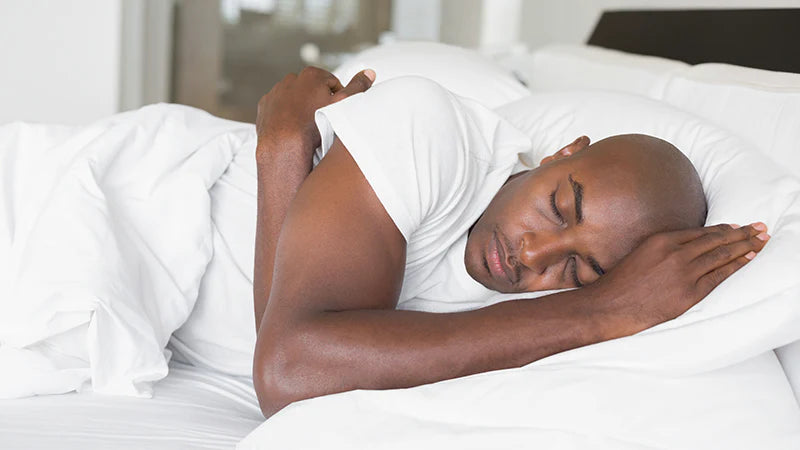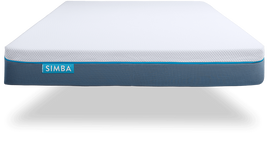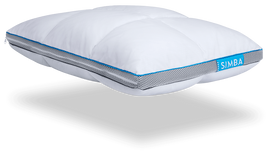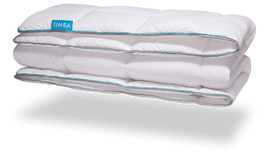WHAT IS DEEP SLEEP?
What does deep sleep mean and how much do you need? Not to be confused with REM sleep, the two are very different. Deep sleep - also called slow-wave or delta sleep - is the third stage before REM sleep. Deep sleep is actually classified as one type of non-REM sleep. Sleep happens in five stages: 1, 2, 3, REM, wake. Stages 1 to 3 are classified as non-rapid eye movement (NREM) sleep, with each stage getting progressively deeper. So even if you’re not much of a dancer, you’ve definitely got rhythm.
NONREM STAGE 1
Ever had those moments where you feel yourself ‘jerk’ or have a ‘falling sensation’ and wake up? Don’t worry, it’s very common! This is the lightest stage, or the bit where you’re ‘drifting off’.
NONREM STAGE 2
You breathing and heart rate slow even more, your body temperature drops and muscles relax. Things begin to slow down. Your body temperature, breathing and heart rate drop, muscles relax and eye movements stop. Your brain, on the other hand, is going wild. It will experience a series of ‘sleep spindles’ - that is, spikes of activity in brain wave frequency - before slowing down again.
NONREM STAGE 3 - WELCOME TO DEEP SLEEP - THE HARDEST STAGE TO WAKE UP IN
The electrical activity in the brain is at its slowest - appearing in long slow waves called delta waves, which have a frequency of 0.5-2 Hertz. Your muscles relax, heart rate and breathing slows. Your body can enter this stage about 30 - 45 minutes after falling asleep. Deep sleep means you’re likely to feel disoriented when you wake up from this sleep. There are normally no dreams during sleep.
REM SLEEP
Cue intense brain activity. Your heartbeat is quicker and irregular during this stage. As the same rapid-eye-movement suggests, the irises dart around quickly under your eye-lids. You have your most vivid and active dreams during this stage. This fourth stage of sleep is the most restorative and deepest part of your sleep, which is where the confusion can crop up! REM happens around 90 minutes after drifting off. You can experience 3-5 periods of REM sleep each night. Each lasting around 10 minutes, with the final one up to an hour.
WHY IS DEEP SLEEP IMPORTANT?
Deep sleep - also called NonRem Stage 3 - is the essential part of sleep you need to feel refreshed when you wake up in the morning:
- Repairing the body and clearing waste from the brain
- The body repairs itself during this period – replacing cells, building muscle tissue and healing wounds
- Clearing waste from the brain also happened during slow wave sleep
- Getting enough deep sleep helps improve memory, muscle growth, and immunity
- Non-REM sleep - Deep Sleep - is thought to help us remember facts and information, whereas REM sleep is associated with remembering how to do something like riding a bike
WHAT HAPPENS IF YOU DON'T GET ENOUGH DEEP SLEEP?
Not getting enough deep sleep can make you susceptible to infection and enhance the risk of long-term health concerns. Learning can also become more difficult.
HOW MANY HOURS OF DEEP SLEEP DO YOU NEED?
Deep sleep is the third stage of sleep that is vital for waking up feeling ready for the day and alert. If you’re wondering how much deep sleep you need a night, there are no specific guidelines for how many hours of deep sleep you need, but studies recommend that most adults should try for 7-9 hours of sleep per night. In healthy adults, approximately 13-23 per cent of your sleep is deep sleep. So if you sleep for 8 hours, that’s around 1-2 hours of this non-REM stage 3 sleep.
HOW TO TELL IF YOU'RE NOT GETTING ENOUGH DEEP SLEEP
You can encourage yourself to get the full nights you need by tracking your sleep. Any sleep tracker app can do it from your phone, without the need to wear a tracker if you don’t want to. And you’ll be able to build a profile of your typical sleep style and get some tips for getting better sleep, too.
TIPS FOR GETTING MORE DEEP SLEEP:
A National Sleep Foundation survey found that 92 percent of people say a comfortable mattress is important to a good night's sleep. Simba mattresses have already helped over 1 million Canadian sleepers get their best night’s sleep ever. From our unique Aerocoil® springs to our cooling, open cell foam, our ground-breaking mattress technology is engineered to keep you perfectly cool and cushioned, all night long, giving you a great chance of enjoying deep sleep. A good mattress offers a perfect fusion of comfort and support, keeping the natural spinal aligned and body posture in place, lulling you into a deeper and more restorative Sleep.







